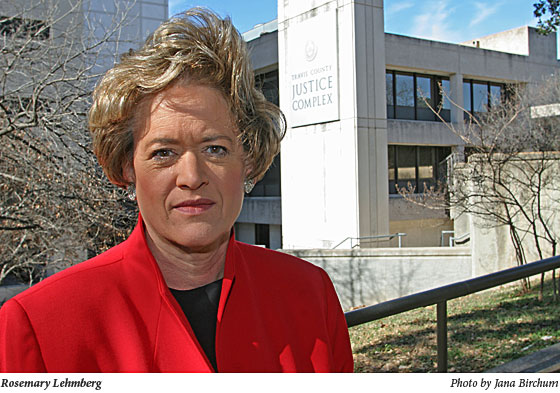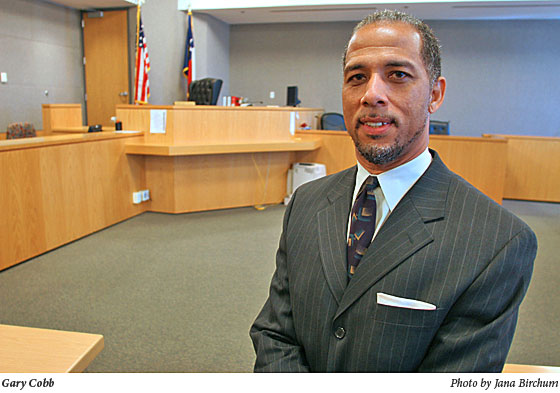Replacing Ronnie Earle
The Race to Become the Most Important Prosecutor in Texas

This article has been updated. Last update: January 21, 2007
The Texas Legislature is infamous for its pay-to-play culture. Most of the time, we suspect, corruption operates just below the surface, silently poisoning the democratic process. There is but one check on this process. State law gives a single prosecutor, the Travis County district attorney, the power to criminally investigate state officials, the lone quality-control person at the end of the line. Now, for the first time in decades, a contested election will determine Texas’ most important prosecutor.
Ronnie Earle has held the office for 31 years. Earle often remarked that while prosecuting drug dealers and burglars was necessary, his most important work was protecting the democratic process from malignant special interests. As the role of corporate money has grown in recent years, Earle has become more visible, the Eliot Ness of Texas politics. Unlike other oversight bodies in Texas-particularly the diffident Texas Ethics Commission-Earle and his stable of attorneys have shown an appetite for enforcement. His office includes a division-known as the Public Integrity Unit-devoted to rooting out political corruption. It has caught national attention lately after securing the indictment of former House Majority Leader Tom DeLay, along with various associates, for campaign-finance violations.
In December, after Earle announced he wouldn’t seek re-election, four Democrats-all members of Earle’s staff-filed to replace him. In heavily Democratic Travis County, where no Republican bothered to file, the next district attorney will be chosen in the Democratic primary on March 4.
Lawmakers and lobbyists have carped about Earle for years. The Legislature tried cutting his budget, but Earle persisted and won election after election. So this year’s primary is the first chance in a long while for special interests to influence the Public Integrity Unit, making the election one of the most important to watch.

Each of the four candidates to replace Earle has a different view on the role of the integrity unit. The early front-runner is Rosemary Lehmberg. She has worked in the Travis County DA’s office for three decades (preceding even Earle’s arrival by six months). For the past 10 years, she’s served as first assistant district attorney-Earle’s second in command. He gave her his enthusiastic endorsement after the filing deadline in early January. A stately woman of 58, Lehmberg is the most experienced candidate. She has worked in and supervised every division of the DA’s office, including the integrity unit. “She has the most experience. She has the best judgment that has been tempered by steel,” Earle told reporters. “So I think she would make the best district attorney for Travis County.”
Lehmberg characterized the integrity unit as one of the office’s most important divisions. “I feel very strongly that our government is not for sale, that our democracy is not for sale,” she said. “I have always viewed our role as somewhat the guardian over the state Capitol. And that doesn’t mean you’re heavy-handed, that doesn’t mean you overreach. But that separation, that balance, that mutual oversight is healthy and necessary.”
She argued that such power must be used delicately. She noted that the office receives numerous complaints of corruption-many of them politically motivated-that must be weeded carefully. “In the political world, the mere fact of an investigation can destroy a career. We try to thoroughly ferret out the facts and the law before [a case] goes too far and it winds up on the front page of the paper,” she said. “That doesn’t mean we hide it, but I have learned how sensitive they can be.”
Candidate Rick Reed, an assistant district attorney, styles himself as the one in the race who will truly go after political corruption. He draws inspiration from his father, Dick Reed, a two-term state representative from Dallas who was a member of the famed “Dirty 30” reform group of the early 1970s. Rick Reed, 52, joined the Travis County DA’s office nine years ago after an unsuccessful run for DA of Dallas County. Earle transferred him to the integrity unit in late 2003 to investigate allegations of campaign finance violations against DeLay and assorted political action committees. Reed is credited with building much of the case against DeLay.
In an interview, Reed publicly revealed bitter dissension that seized Earle’s office before the DeLay indictment. He says his colleagues, including Lehmberg, wilted at the prospect of seeking an indictment against one of the nation’s most powerful politicians. “Everyone felt the pressure. Different people reacted differently to it,” Reed said. “I was the only person pushing to present the case to the grand jury.”
By fall 2005, the grand jury had already indicted two of DeLay’s associates from the controversial 2002 campaign-John Colyandro and Jim Ellis. Everyone in the DA’s office seemed to agree on the Ellis and Colyandro cases, Reed said, adding that much of the same convincing evidence also implicated DeLay.
“Yet when it came to Mr. DeLay, the suggestion was that he’s a very powerful man, therefore we ought to be more careful in making this decision, and we ought to be reluctant to do it because of the fact he’s so powerful,” Reed said. “The issue that motivated the argument was political: He’s a powerful man, and the sky’s going to fall if we present this to the grand jury. … I’ll tell you quite candidly, that offended me. It offended me then, and it offends me now. In the American judicial system, I think every person ought to be treated equally. Whether or not a person holds a political office just shouldn’t be a consideration.”
Reed said Lehmberg opposed seeking an indictment, as did several of the other prosecutors. He said he believes Lehmberg wouldn’t have indicted DeLay had she been DA at the time. Reed said he convinced Earle through a series of conversations and memos, besting the three other veteran prosecutors.
Asked about her position on the DeLay indictment, Lehmberg said, “My job as Ronnie Earle’s first assistant is to make sure that all sides of every issue are fully considered. It has been my role to participate with Ronnie at the highest level of decision-making. Rick was an important part of the team. He is really good at the legal work. He wrote outstanding briefs. He is passionate about public corruption cases, for sure. But there really was a big difference between Rick’s role and mine. My role was to talk with Ronnie about all the pros and cons of the case.” She added that she helped present the case to the grand jury.
Earle refused to comment about internal office discussions, but said that Reed’s account was “not an accurate description.”
Reed traces the alleged hesitation to indict a powerful figure in part to the trauma from the collapse of Earle’s corruption case against U.S. Sen. Kay Bailey Hutchison in February 1994. (Earle had decided not to proceed with the Hutchison case right before trial; it has long been a stain on his record.)
Lehmberg responds that the Hutchison case had no impact on the DeLay indictment. “It wouldn’t be relevant,” she said. She noted that she didn’t work on the Hutchison investigation, nor did Reed. “I can’t really speak to what Rick’s impression is. He was not there. I wasn’t the first assistant. I was the director of the Family Justice Division, and frankly was working on a baby death at the time.”
Reed views Lehmberg’s handling of the DeLay case as an indication of the kind of district attorney she would be. He noted that Lehmberg waited until the last minute to enter the race. He said Lehmberg has at times been indecisive.
“I’m the kind of person who’s going to consider all sides of an important decision, and this was an important one for me,” Lehmberg said. “When I determined that I believed I was the right person to lead that office, I announced, after talking with my family and friends, that I was running for district attorney.”
Among the four candidates, none is as close to the Legislature as Mindy Montford. She served as general counsel for state Sen. Eddie Lucio, a Brownsville Democrat, from 1997 to 1999. Her father, John Montford, is a former state senator who’s now head lobbyist for AT&T Inc.
Mindy Montford, 37, has worked in the Travis County DA’s office for the past eight years, two of them in the Public Integrity Unit on the DeLay case. Though she helped investigate DeLay, Montford wasn’t directly involved in the decision to seek an indictment. She asked for a transfer to the child abuse division in summer 2005.
“The reason [the integrity unit] is so important is because if we didn’t have it, some of our public officials would be running rampant. Ultimately if you don’t have faith in your leaders, you don’t have faith in your government, and that really undermines democracy as a whole,” Montford said. “Having said that, the average person on the street wants to feel safe and wants to know if there’s a sex offender living next to them. You’ve got to have a balance.”
Montford would like to build a closer relationship with state politicians than Earle. “We’ve got to educate the Legislature and the lobby that, ‘Look you’ve got nothing to be afraid of if you’re following the law.’ We’re not on a witch hunt here,” she said. “I think you have to be visible and have constant meetings with people who could be before you as a witness or a suspect, and let them know how the unit operates. Then they will trust what you do, and they won’t care what political party you are. It’s going to the Capitol and meeting. You’ve got to be able to be welcomed down there. It obviously wouldn’t be possible to meet with every elected official, but it wouldn’t be bad to have a forum where we explain to them how the process works and ask them what improvements they want to see.”
Montford already has a relationship with the lobby, and its largesse has allowed her to run television advertising in Austin’s expensive media market. She expects to need $250,000 for the DA’s race, and has looked to her father to help scrounge up funds. She concedes that the business lobby has donated some large checks to her campaign. But she points out that her rivals are receiving contributions from the defense bar, including attorneys who represented DeLay and Texas House Speaker Tom Craddick. Montford has the early fund-raising edge, collecting more than $45,000 through the end of December, $10,000 more than Lehmberg.

The only candidate not involved in the DeLay investigation is Gary Cobb. The 46-year-old served under Earle for the past 17 years. He’s the only one of the four candidates with no experience in the integrity unit, though he touts his record as a tough prosecutor in other areas, including stints heading the child abuse division and the sex crimes unit.
Cobb pitches himself as an aggressive prosecutor who would run a swifter integrity unit. “It’s one thing to indict someone or charge someone with a public integrity crime,” he said. “But the real key to it is having the prosecutors in place who will proceed aggressively in prosecuting those cases.”
Asked if the unit had acted assertively enough in recent years, Cobb said, “You have to look at the way we’ve handled cases and let that speak for itself. But one of the things I stand for is being more aggressive in the prosecution of cases once we decide a case needs to be indicted.”


